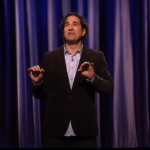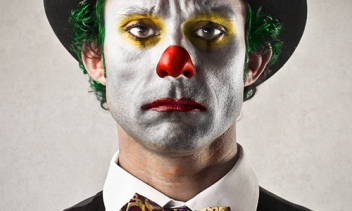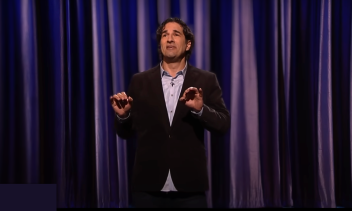I take comedy very seriously. Beginning in 2017 and continuing through today, I write a humor column for Mishpacha magazine. It brings a lot of smiles to a lot of people. But oftentimes, people approach me and say, somewhat dismissively, “cute column.” My instinct is always to correct them. Humor is one of the toughest forms of communications. Writing anything that evokes emotion is challenging—writing humor, however, is particularly difficult.
In 1949, a twenty-four year old student at the University of Nebraska completed his undergraduate senior thesis on the topic of “Writing Comedy for Radio.” The student reminds fans of comedy that, “few people realize the preparation that goes into writing a joke.” Comedy may earn some hearty laughs, but it rarely earns respect. “The comedy gag writer,” the thesis reminds, “is truly a forgotten soul.” That student was Johnny Carson, the host of the Tonight Show for thirty years. But underneath the seemingly simple story of comedy is a larger story about what makes us human and how we construct narratives to find meaning within the pain and perceived meaninglessness of everyday life.
There are several theories that try to explain what makes something funny. Some have emphasized humor’s ability to affirm our superiority. Laughter, in this school, always comes at someone else’s expense—and that expense purchases a momentary feeling of supremacy. Others—most famously Freud—emphasize comedy’s ability to provide a sense of relief for our pent up emotions. Freud writes:
If there is a situation in which, according to our usual habits, we should be tempted to release a distressing affect and if motives then operate upon us which suppress that affect in statu nascendi [in the process of being born]… . The pleasure of humor … comes about … at the cost of a release of affect that does not occur: it arise from an economy in the expenditure of affect.
This theory certainly has merit, but it leads to some uncomfortable and questionable conclusions about what makes us laugh. For example, does anyone who laughs at a joke in poor taste have repressed feelings or aggression or bias?
Comedy seeks a life with meaning and when situations and circumstances seem bereft of sense, comedy provides one.
The theory that has always resonated with me is known as the Incongruity Theory of humor. Simply stated, this theory explains that humor arises when a normal sequence is abruptly broken. For instance, a well-dressed man is not expected to slip on a banana peel. The larger the incongruity the more potential for humor. The philosopher Schopenhauer explains it this way:
Many human actions can only be performed by the help of reason and deliberation, and yet there are some which are better performed without its assistance. This very incongruity of sensuous and abstract knowledge, on account of which the latter always merely approximates to the former, as mosaic approximates to painting, is the cause of a very remarkable phenomenon which, like reason itself, is peculiar to human nature, and of which the explanations that have ever anew been attempted, as insufficient: I mean laughter… . The cause of laughter in every case is simply the sudden perception of the incongruity between a concept and the real objects which have been thought through it in some relation, and laughter itself is just the expression of this incongruity (1818/1844 [1907], Book I, sec. 13).
The setup for a joke establishes a sequential line of thinking—the punchline introduces the incongruity.
The reason I have always found this theory so satisfying is because I think it speaks to one of the primary tools human beings use to cope with the incongruities of life. Whether the jokes are about our mothers, celebrity worship, airport tuna fish sandwiches, or parenting, comedy is commentary on the chaos of life. A satisfying life that unfolds sequentially is hardly grist for comedic material. Life’s frustration, disappointments, and perceived meaninglessness is what makes the comedic lens so valuable.
James K. Feibleman, a little known philosopher, wrote an obscure article in The Journal of Philosophy (35:16, 1938) where he explains what comedy seeks:
Comedy then, criticizes the finite for not being infinite. It witnesses the limitations of actuality, just as a tragedy witnesses the fragmentary exemplifications of the logical order. Tragedy affirms continuity by showing how it exists in every actual thing and event. Tragedy shows the worth of every actual, down to the most ephemeral, and so is always close to the permanent value of the worshipful. Comedy comes to the same affirmation, but inversely and by indirection, just as one might affirm beauty by criticizing the ugly. Comedy catches the principle of unity in every finite thing…
Great comedians are commentators. They highlight a finite world in disarray and through comedy, a lens of meaning is superimposed onto our quotidian lives. Comedy seeks a life with meaning and when situations and circumstances seem bereft of sense, comedy provides one.
In perhaps the grandest sense, the meaningfulness which comedy seeks lies at the heart of our human experience. It is how we ultimately seek to construct our respective sense of self. Life is filled with all sorts of moments and routines that seem short of true import. Comedy is one way in which we criticize the finite moments of our existence and “catches the principle of unity in every finite thing.”
While David Foster Wallace, beloved writer and teacher, was no stranger to tragedy, he wrote eloquently of comedy. In an address later published in Harper’s, he discussed the challenges of teaching the absurdist humor of Kafka:
The psychology of jokes helps account for part of the problem in teaching Kafka. We all know that there is no quicker way to empty a joke of its peculiar magic than to try to explain it—to point out, for example, that Lou Costello is mistaking the proper name “Who” for the interrogative pronoun name “who,” etc. We all know the weird antipathy such explanation arouse in us, a feeling not so much of boredom as offense, like something has been blasphemed …. And it is this, I think, that makes Kafka’s wit inaccessible to children whom our culture has trained to see jokes as entertainment and entertainment as reassurance. It’s not that students don’t “get” Kafka’s humor but that we’ve taught them to see humor as something you get—the same way we’ve taught them that a self is something you just have. No wonder they cannot appreciate the really central Kafka joke—that the horrific struggle to establish a human self results in a self whose humanity is inseparable from that horrific struggle. That our endless and impossible journey toward home is in fact our home. It’s hard to put into words up at the blackboard, believe me. You can tell them that maybe it’s good they don’t “get” Kafka. You can ask them to imagine his art as a kind of door. To envision us readers coming up and pounding on this door, pounding and pounding, not just wanting admission but needing it, we don’t know what it is but we can feel it, this total desperation to enter, pounding and pushing and kicking etc. That, finally the door opens … and it opens outward: we’ve been inside what we wanted all along. Das ist komisch.
Listen to our introductory episode for Comedy.








